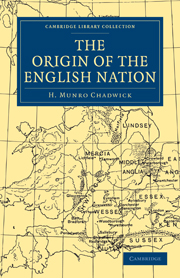Book contents
- Frontmatter
- PREFACE
- Contents
- CHAPTER I ENGLAND IN THE SIXTH CENTURY
- CHAPTER II THE WEST SAXON INVASION
- CHAPTER III THE INVASION OF KENT
- CHAPTER IV THE SAXONS, ANGLES AND JUTES IN BRITAIN
- CHAPTER V THE SAXONS, ANGLES AND JUTES ON THE CONTINENT
- CHAPTER VI THE KINGS OF ANGEL
- NOTE. THE EARLY KINGS OF THE DANES
- CHAPTER VII THE AGE OF NATIONAL MIGRATIONS
- CHAPTER VIII THE SAXONS AND ANGLES IN ROMAN TIMES
- CHAPTER IX THE CLASSIFICATION OF THE ANCIENT GERMANI
- CHAPTER X THE CULT OF NERTHUS
- CHAPTER XI KING AETHELWULF'S MYTHICAL ANCESTORS
- CHAPTER XII SOCIAL CONDITIONS OF THE ROMAN PERIOD
- ADDENDA
- INDEX
- Plate section
CHAPTER VIII - THE SAXONS AND ANGLES IN ROMAN TIMES
Published online by Cambridge University Press: 07 September 2010
- Frontmatter
- PREFACE
- Contents
- CHAPTER I ENGLAND IN THE SIXTH CENTURY
- CHAPTER II THE WEST SAXON INVASION
- CHAPTER III THE INVASION OF KENT
- CHAPTER IV THE SAXONS, ANGLES AND JUTES IN BRITAIN
- CHAPTER V THE SAXONS, ANGLES AND JUTES ON THE CONTINENT
- CHAPTER VI THE KINGS OF ANGEL
- NOTE. THE EARLY KINGS OF THE DANES
- CHAPTER VII THE AGE OF NATIONAL MIGRATIONS
- CHAPTER VIII THE SAXONS AND ANGLES IN ROMAN TIMES
- CHAPTER IX THE CLASSIFICATION OF THE ANCIENT GERMANI
- CHAPTER X THE CULT OF NERTHUS
- CHAPTER XI KING AETHELWULF'S MYTHICAL ANCESTORS
- CHAPTER XII SOCIAL CONDITIONS OF THE ROMAN PERIOD
- ADDENDA
- INDEX
- Plate section
Summary
In an earlier chapter we saw (p. 51) that according to Bede the invaders of Britain belonged to three different nations, namely the Saxons, the Angli and the Iutae. Those of the invaders who were called Saxons were sprung from the Old Saxons, a nation which in the seventh and eighth centuries extended from the Rhine to Holstein and which is found in the neighbourhood of the former as early as the middle of the fourth century (p. 85 ff.). The Angli came from a country called Angulus, a name with which the corrupt Oghgul of the Historia Brittonum seems to be identical. The evidence of later writers, King Alfred in his translation of Orosius and Aethelweard in his chronicle, leaves no room for doubt that they believed this country to be the district now called Angel, though the name may then have been applied to a larger area. The home of the Iutae is not directly specified by Bede or by any subsequent writer; but the statement that Angulus was situated between the Saxons and the Iutae seems distinctly to point to Jutland. Continental writings from the third century onwards afford no evidence worth consideration which conflicts with these views.
In a later chapter (p. 111 ff.) we examined certain traditions which refer to two persons named Wermund and Offa, ancestors of the Mercian royal family, and we saw that according to Widsith the latter ruled over Angel. In the course of our discussion also we noticed that these persons are clearly identical with two kings named Wermundus and Uffo who are mentioned in Danish traditions.
- Type
- Chapter
- Information
- The Origin of the English Nation , pp. 181 - 194Publisher: Cambridge University PressPrint publication year: 2010First published in: 1924



